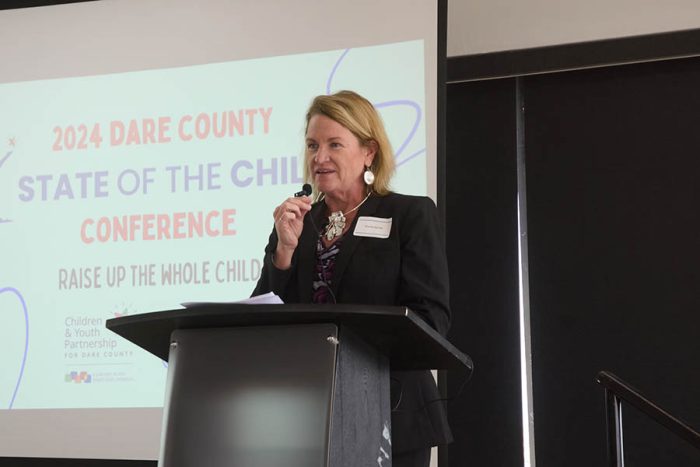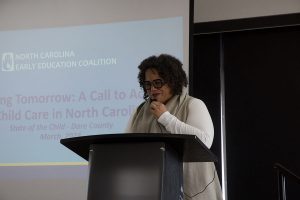CYP State of the Child Conference highlights crisis in childcare

Hosted by Dare County Children and Youth Partnership (CYP), the 2024 State of the Child Conference at the Ramada Plaza on Thursday, March 14, presented a troubling picture of a growing crisis in childcare impacting the economic well-being of parents and the ability of employers to fully staff their businesses.
Dare County Director of Health and Human Services Sheila Davies opened the conference with a discussion of survey data gathered by CYP for the conference. What it showed was that childcare resources were failing to meet the needs of parents.
“There are approximately 1,600 children aged zero to five in Dare County, but there are only 550 childcare spots,” she told the attendees.
In fact, she explained, there are not actually 550 slots. The slots are what childcare centers and providers are allowed based on staffing, but “they [providers] have vacancies so they can’t extend a spot…because they don’t have a teacher or a childcare worker.”
The issues confronting childcare in the county, Davies explained, are driven by two interrelated factors. Regulations ensuring the safety of preschool children are expensive to put into place and maintain, and because of that, she said, “childcare centers and homes have very thin operating margins.”
Because of those thin operating margins, childcare workers are almost always poorly paid. At $13 to $15 per hour in Dare County, childcare workers are a little better paid than the average childcare worker for North Carolina, Davies said, but the low pay increases staff turnover and makes it more difficult for childcare centers to hire the childcare workers they need.
That critical shortage of childcare workers affects far more than the families with preschool children.
“Without childcare available for our most young, we can’t function as a society by employing people to do the work that needs to happen throughout our county,” Davies asserted. The impact that a lack of childcare has on employees was seen in employer concerns in the CYP survey data.
“Seventy-six percent of survey respondents indicated that employee childcare issues have impacted scheduling or staffing in their business,” Davies said.
The childcare problem, however, doesn’t seem to have substantially damaged Dare County’s reputation as a place to raise kids. Davies pointed to another Dare County Community Health Needs Assessment done every three years in collaboration with the Outer Banks Hospital that found that 77 percent felt that Dare County is a good place to raise children.
In her presentation, Nurturing Tomorrow: A Call to Action for Child Care in North Carolina, Susan Butler-Staub of the NC Early Education Coalition echoed much of what Davies said, drawing attention in particular to the contrast between the importance of early childhood development and what early childhood workers are paid.
“We’ve known…for years that in the first three years of children’s lives…the human brain grows faster than at any other point in life,” she said. But she went on to say that “the teachers, the caregivers who are in these programs, nationally as well as in North Carolina, are the lowest educated and the lowest paid.”

Butler-Staub referenced a recent state report that found that “North Carolina is losing $3.5 billion a year in tax revenue, because we don’t have childcare for the businesses that want to come here.” But she pointed to initiatives within the state that could improve the situation.
Through the state’s Smart Start Partnership for Children, North Carolina provides supplemental income through its WAGE$ program. What the program does is provide supplemental income to childcare workers who meet education and certification qualifications.
“We found that…individual childcare teachers who worked and participated in the program had an average six-months supplement of over $1,200,” Butler-Staub said.
The program is not available in all counties and Dare County is not listed on the WAGE$ website as participating, but “we’ve been working to have that be available statewide,” she added.
In Yadkin County, in order to create a childcare center, “businesses, nonprofit members, and other community leaders got together and envisioned a whole new type of childcare program,” Staub said.
The concept is to take an existing building, create a common playground and other common areas that would be administered by a manager. Rooms, however, would be available to individual childcare workers.
“Within those individual rooms, a caregiver will have their own license, will have their own policies, their own procedures, their own enrollment,” Staub explained.

The final presentation of the morning from Dr. Nefertiti Poyner of the Devereax Center for Resilient Children, focused on the anxiety that is a part of every in a child’s life. Describing the stress that exists in a child’s life—or anyone’s life—as an invisible suitcase, she focused on how important it is to remember the suitcase is there.
“One of our responsibilities as professionals in this field, whether you’re the child’s parent or teacher or doctor or a member of their church congregation, you have to remember that every child has an invisible suitcase,” she said.
In talking about resilience, she emphasized that it is best to learn how to cope with stress as early as possible, but that building a resilient community means being available to teach the skills.
“What I see in the research is that it’s never is too late…It gets a bit harder because if I’m six and I didn’t trust people, and I’m seven and eight and that foundation is not getting built to where now I’m 26…it’s gonna take a little bit more to push through. But every child deserves that opportunity,” she said.















